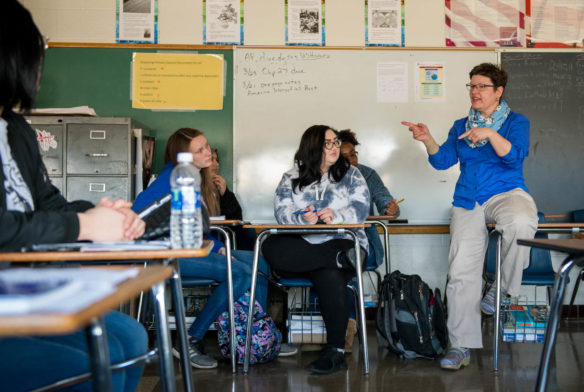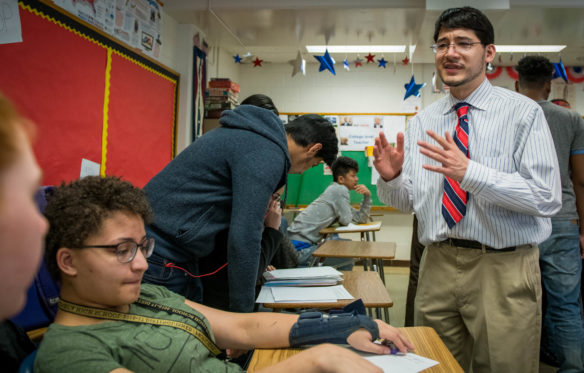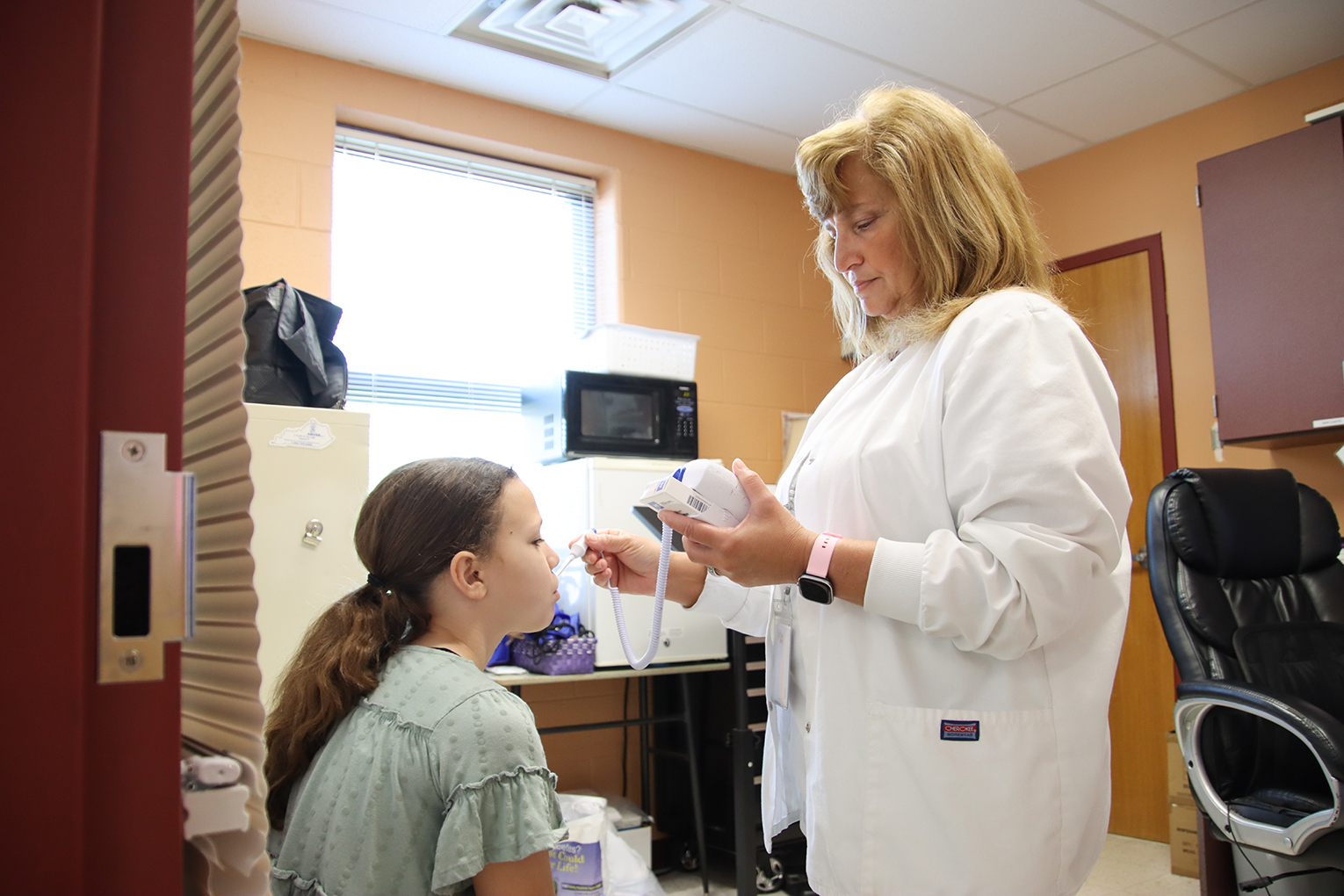
Stephanie Anderson, far right, discusses the effects of tariffs with her Advanced Placement U.S. History class at Seneca High School (Jefferson County). The Kentucky Department of Education is setting aside funds for the second consecutive year to pay for AP exams taken by students who qualify for free and reduced-price meals.
Photo by Bobby Ellis, March 19, 2018
By Mike Marsee
mike.marsee@education.ky.gov
The Kentucky Department of Education (KDE) is once again making it easier for more students to take Advanced Placement (AP) exams.
For the second consecutive year, KDE is setting aside funds to pay for AP exams taken by students who qualify for free and reduced-price meals, opening the door for those students to improve their chances for success in college. The decision also removes a potentially big financial obligation for districts.
KDE will pay for the portion of each exam fee that is not covered by discounts or rebates, leaving districts, schools and qualifying students with no cost.
“The fact that we’re able to fund the exams this year has been a huge help to many schools,” said Jennifer Pusateri, the AP state coordinator for KDE.
Pamela Royster, an academic integration specialist with the Jefferson County schools, said she’s thrilled that KDE has made funding the exams a priority, even in challenging financial times.
“It puts a value on those advanced learning opportunities and on leveling the playing field for students who couldn’t otherwise afford those exams. It increases the commitment that the state has to access,” Royster said. “There has been a push to get the AP student population to look more like the overall population, and this is one of the ways we can do that.”
Commissioner of Education Stephen Pruitt said funding AP exams for qualifying students gives them a greater chance to succeed.
“We recognize that when given the opportunity and access to take rigorous coursework like AP, Kentucky’s low-income students are finding unprecedented success,” Pruitt said. “We hope that our schools will continue to provide low-income students with the opportunity to take rigorous AP courses that prepare them to excel in their future college and career choices.”
Data compiled by AdvanceKentucky, a statewide mathematics and science initiative designed to help students work toward rigorous academic achievement, particularly among traditionally underrepresented populations, indicates that students who take AP courses and exams are more likely to succeed in college.
According to data presented in AdvanceKentucky’s annual report on the class of 2012, each step of the AP experience – enrolling in an AP course, taking the AP exam and earning a qualifying score – leads to an increase in participation and persistence in college. Low-income students who earned at least one qualifying score of three or more (the score that typically qualifies students to receive college credit for AP coursework) on any AP math, science or English exam saw the greatest advantage in participation and persistence, with 62 percent of them remaining enrolled in college through three years.
Kentucky schools and districts are required by law to waive any fees charged by the district – including course fees – for students who qualify for free or reduced-price meals. Districts would be responsible for the balance of those exam fees – $53 per student – if KDE did not cover those costs.
Results from the 2016-17 school year show that removing that burden from districts has led to higher participation and higher achievement. In 2016-17, the number of AP exams taken by low-income students increased by 13.9 percent over the previous year. The number of these exams with a qualifying score also increased by 13.9 percent.
“The people at College Board were stunned by that,” Pusateri said. “They expected some growth in the both areas, but to match that exactly was pretty remarkable.”
The General Assembly mandated in 2008 that KDE cover the cost of all students’ AP or International Baccalaureate Diploma Program exams, but that remains an unfunded mandate.
In 2015-16, districts were required to cover only $15 of the $93 exam fee for students who qualify for free or reduced-price meals thanks in part to the U.S. Department of Education’s Advanced Placement Test Fee Grant Program, which provided funding for low-income students to take AP exams at a reduced rate. The grant, which ended in 2016, paid $38 per exam, the College Board provided a $31 fee reduction, and a discount of $9 per exam for low-income students also was applied.
“Once the grant went way, the cost went back up to $53 per student,” Pusateri said. “Last year that was going to be passed along to each district. Instead, free and reduced-price meals students paid nothing for the exams, and the $53 didn’t get passed along to the schools.”
That KDE funding prevented districts from having to absorb about $800,000 in costs.
Royster said AP teachers at schools in Jefferson County were excited to learn that KDE would be funding exams once again.
“From their perspective it was going to be covered anyway, but knowing that our most vulnerable kids have been given this opportunity has been a relief,” she said. “Students were excited, too. Even though they don’t feel the pain of it, they know it costs somebody.”

Chris Woo, right, a teacher at Seneca High School (Jefferson County), talks to Courtney Newton, left, during Woo’s AP Government and Politics class. KDE’s plan to pay for AP exams for qualifying students could improve those students’ chances for success in college and removes a financial obligation for districts.
Photo by Bobby Ellis, March 19, 2018
In the 2016-17 school year, 32,192 Kentucky students took 51,637 AP exams. The most widely given tests were in AP English Language and Composition, AP English Literature and Composition, AP U.S. History and AP Human Geography.
Royster said Jefferson County has seen a 4 percent increase over the past two years in students taking AP courses and a 10 percent growth in students taking exams. She said 6,916 Jefferson County students took 11,907 AP exams last year, and about 35 percent of those exams qualified for the fee waiver.
“For us, the cost to cover that fee gap would be about $225,000,” she said. “It’s a huge help for us.”
She said it’s also helping students, because earning a qualifying score on an AP exam can save them money on college courses they don’t have to take.
“It’s saving a student potentially thousands of dollars,” Royster said.
Pusateri said many schools have been shifting away from AP and toward dual-credit courses because of the scholarship assistance available for those courses.
“The fact that we were able to put some money behind AP is helpful,” she said.
Pusateri said many schools and districts had been concerned about how they were going to fund AP exams for their students who receive free and reduced-price meals prior to KDE’s announcement in February.
“Just from the data we’ve seen, in years when we have not known about the funding until very late – March or April – the number of exams for free and reduced-price meals students has gone down significantly,” she said.
Pusateri said she will be part of a KDE webinar within the next month that will detail the steps districts should take to obtain funding for qualifying students’ exams.
MORE INFO …
Jennifer Pusateri jennifer.pusateri@education.ky.gov
Pamela Royster pamela.royster@jefferson.kyschools.us




Leave A Comment